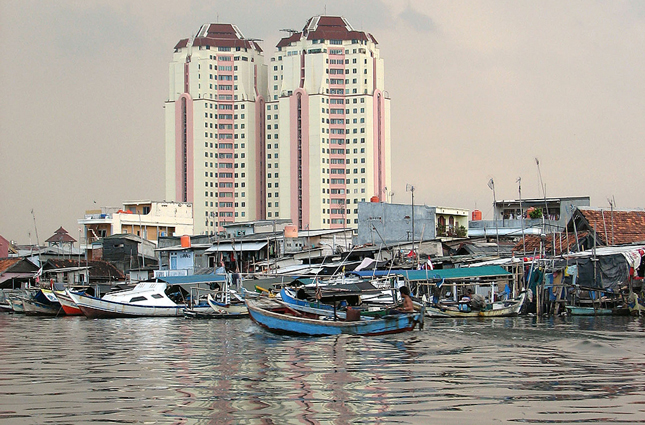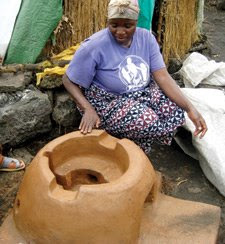Showing posts by Jim Jarvie.
-
Don’t Forget About Governance: The Risk of Tunnel Vision in Chasing Resilience for Asia’s Cities
›
Asia is going through an unprecedented wave of urbanization. Secondary and tertiary cities are seeing the most rapid changes in land-use and ownership, social structures, and values as peri-urban and agricultural land become part of metropolitan cityscapes. All the while, climate change is making many of these fast-growing cities more vulnerable to disasters.
-
Copenhagen’s Chance to Reduce Poverty and Improve Human Security
› The climate community is under increasing pressure to help the developing world, especially those at the “bottom of the pyramid.” The people who did the least to cause climate change will suffer its effects the most.
The climate community is under increasing pressure to help the developing world, especially those at the “bottom of the pyramid.” The people who did the least to cause climate change will suffer its effects the most.
A critical part of the solution to this problem will be enhancing market-based incentives for climate-friendly behavior. The projects that generate credits for sale in the carbon markets vary widely in scale. However, the most successful have focused on large, localized sites, such as the smoke stack of a single plant. These “centimeter-wide, kilometer-deep” projects are easy to monitor and verify.
In contrast, most projects that benefit the poor are “a kilometer wide, a centimeter deep,” with each family across a large territory producing a small emissions reduction. Monitoring and tracking these community-based projects is usually cost-prohibitive.
DRC: Reducing Emissions and Improving Security
A Mercy Corps project in the refugee camps in the eastern Democratic Republic of the Congo (DRC) seeks to improve the security of women and children while simultaneously reducing carbon emissions.
In the war-ravaged province of North Kivu, the total number of Internally Displaced Persons (IDPs) exceeds 850,000. Demand for resources, particularly fuel wood, vastly exceeds the available supply. To collect wood, women and children have to leave the relative safety of the refugee camps, making them vulnerable to sexual assault and child abduction by rebel groups and the army. Mercy Corps surveys indicate that nine percent of women in camps have been raped or otherwise assaulted.
Mercy Corps installs fuel-efficient stoves that reduce the need for dangerous trips into the forest. A commercial carbon broker develops carbon credits from the reduction in emissions that arises from the use of stoves instead of open fires. The upfront funding from the broker supplements a UNHCR grant supporting the project, and serves to help more than 20,000 families in one of the most dangerous places on Earth.
This extreme example is one of relatively few carbon projects generating revenue that benefits vulnerable people. Yet if this kind of project can be successful in the DRC, larger projects in safer countries may be able to generate massive emissions reductions. The Copenhagen conference needs to set the stage for these types of market incentives for better climate behavior.
Raising a REDD Flag
A relatively new, UN-backed initiative known as Reduced Emissions from Deforestation and Forest Degradation (REDD) seeks to compensate forest-rich countries for protecting or regenerating their forests. However, REDD may have the unintended consequences that further erode the human rights of marginalized people dependent on those forests.
For decades, tropical forests have been logged legally and illegally by states and private companies, without any input from or compensation to indigenous forest communities, who, in many cases, were displaced or worse.
REDD thus raises a troubling question: If countries can generate carbon revenues through REDD, to whom do the revenues belong, and how will they be allocated? Many forestry ministries have a long history of corruption and mismanagement. There are already signs of ministries competing over putative REDD funds. And high-level discussions in only a few countries have included the role of communities and civil society in implementing REDD and distributing revenues.
The Copenhagen conference will be a critical milestone in the global fight to address climate change. Yet it raises significant and far-reaching questions concerning economic development and human rights of the world’s most vulnerable citizens that must not be swept under the rug.
Jim Jarvie is director of climate change, environment, and natural resources at Mercy Corps. In a recent video interview, he spoke to ECSP about how humanitarian groups are responding to new climate challenges.
Photo: Stoves that are more fuel-efficient not only help curb rapid deforestation, but help women spend less time gathering wood in dangerous areas. Courtesy Dee Goluba/Mercy Corps.



 The climate community is under increasing pressure to help the developing world, especially those at the
The climate community is under increasing pressure to help the developing world, especially those at the 

